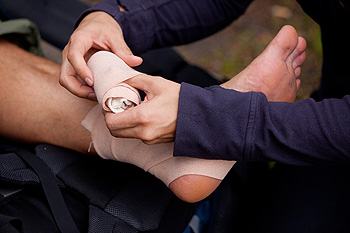Ligaments are strong, stretchy tissues that connect bones and also stabilize joints. Ligaments on the inside and outside of the ankle joint support the ankle and help stabilize it during up-and-down and side-to-side foot movements. An ankle sprain occurs when one or more of these ligaments become overly stretched or torn from a sudden movement, fall, or twist that knocks the ankle out of its normal position. Ankle sprains can occur while participating in sports, walking on uneven surfaces, or twisting your ankle wearing the wrong shoes. People who have had previous ankle sprains or weakened ankles due to genetics may be more prone to experiencing ankle sprains. Walking may prove challenging to a person with an ankle sprain, and they may experience pain, swelling, bruising, or joint stiffness. It is important to seek the care of a podiatrist for an ankle sprain in order to diagnose and treat any additional, more serious injury that may have occurred, as well as to facilitate proper and prompt healing and rehabilitation to avoid chronic ankle instability.
Although ankle sprains are common, they aren’t always minor injuries. If you need your ankle injury looked at, contact one of our podiatrists from Sutera and Jones Surgical Podiatry. Our doctors can provide the care you need to keep you pain-free and on your feet.
How Does an Ankle Sprain Occur?
Ankle sprains are the result of a tear in the ligaments within the ankle. These injuries may happen when you make a rapid shifting movement while your foot is planted. A less common way to sprain your ankle is when your ankle rolls inward while your foot turns outward.
What Are the Symptoms?
- Pain at the sight of the tear
- Bruising/Swelling
- Ankle area is tender to touch
- In severe cases, may hear/feel something tear
- Skin discoloration
Preventing a Sprain
- Wearing appropriate shoes for the occasion
- Stretching before exercises and sports
- Knowing your limits
Treatment of a Sprain
In many cases, the RICE method (Rest, Ice, Compression, and Elevate) is used to treat ankle sprains. However, you should see a podiatrist to see which treatment option would work best with your injury. In severe cases, surgery may be required.
It is important to ask your doctor about rehab options after you receive treatment for your injury. Stretching, strength training, and balance exercises may help the ankle heal while also preventing further injury.
If you have any questions, please feel free to contact one of our offices located in Media, Glen Mills, Riddle Memorial Hospital, and Concordville, PA . We offer the newest diagnostic and treatment technologies for all your foot care needs.

